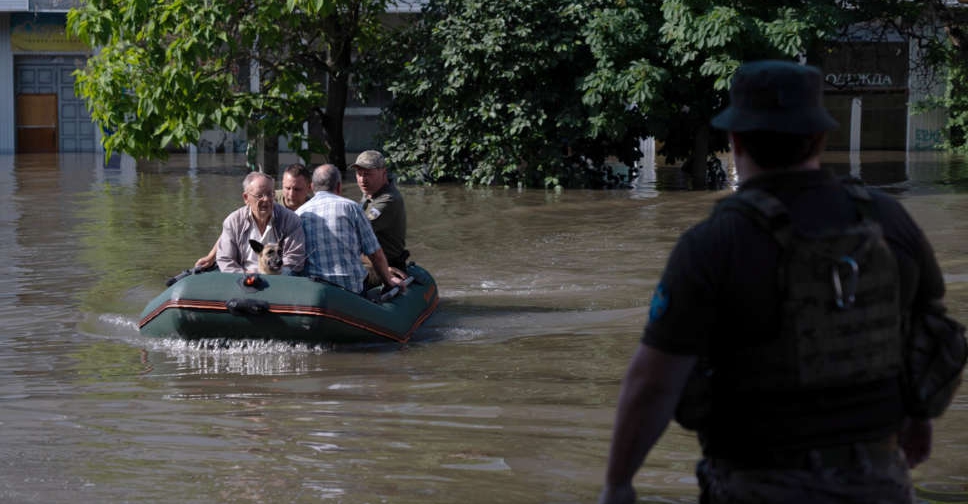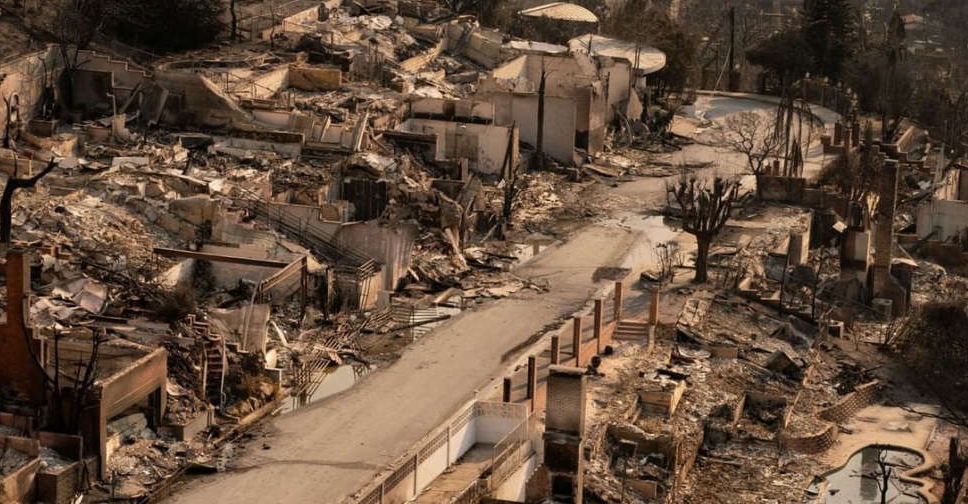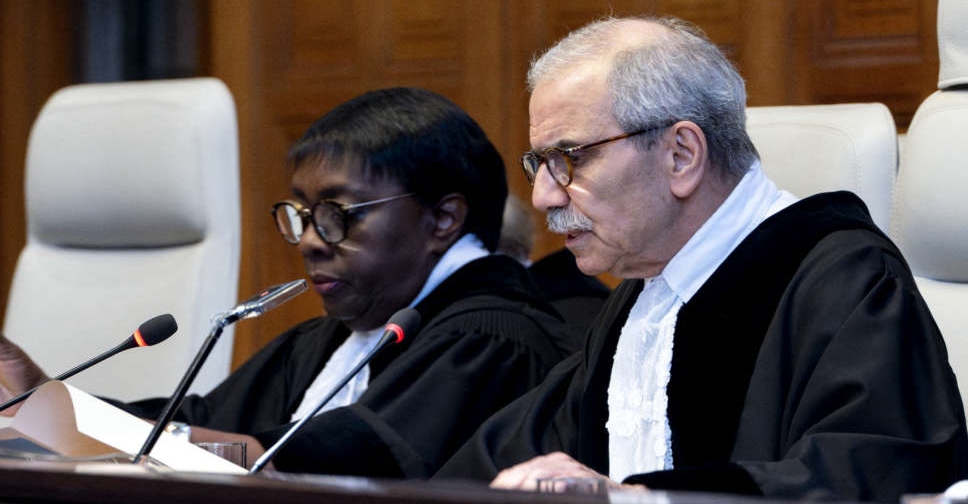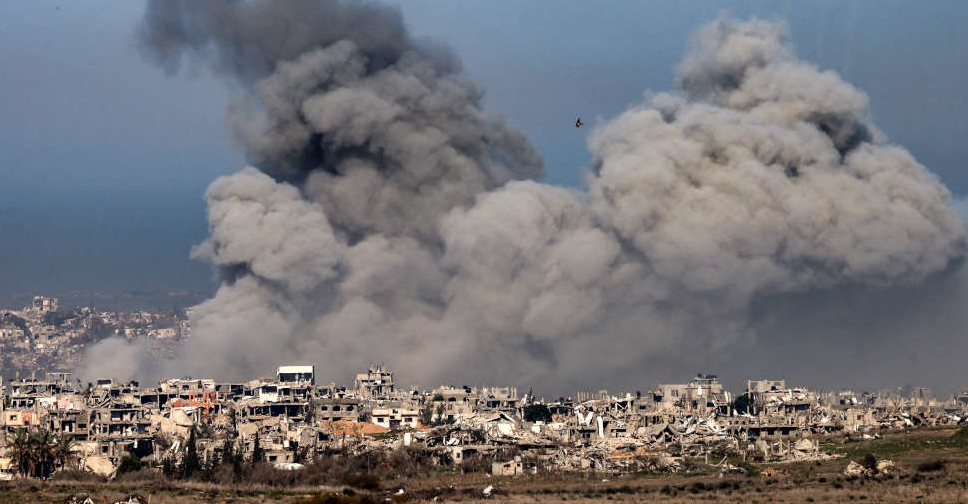
Floodwaters in southern Ukraine were expected to crest on Wednesday, with tens of thousands of civilians fleeing in peril from the destruction of a vast dam that both sides called an act of wartime sabotage.
Residents waded through flooded streets carrying children on their shoulders, dogs in their arms and belongings in plastic bags while rescuers used rubber boats to search areas where the waters reached above head height.
Ukraine and Russia each accuse the other of deliberately destroying the Nova Kakhovka dam in desperation at a major turning point in the war.
Ukraine says 42,000 people are at direct risk from flooding and hundreds of thousands will be left without access to drinking water.
A roof of a house could be seen whisking in the torrent of the Dnipro River.
Residents blamed the disaster on Russian troops who controlled the dam from their positions on the opposite bank.
Russia imposed a state of emergency in the parts of Kherson province it controls, where many towns and villages lie in lowlands below the dam. Residents there have told Reuters by telephone that Russian troops patrolling the streets in waders were threatening civilians who approached.
A zoo by the riverbank on the Russian side flooded, killing all the animals inside, staff said.
The consequences of the disaster will be felt for decades in southern Ukraine. The huge reservoir behind the dam was one of Ukraine's main geographic features, and its waters irrigated huge swathes of agricultural land in one of the world's biggest grain-exporting nations, including Crimea, seized by Russia in 2014.
The flood "will have grave and far-reaching consequences for thousands of people in southern Ukraine on both sides of the front line through the loss of homes, food, safe water and livelihoods," UN aid chief Martin Griffiths told the Security Council. "The sheer magnitude of the catastrophe will only become fully realised in the coming days."
Targeting dams in war is explicitly banned by the Geneva Conventions. Neither side has presented public evidence demonstrating who was to blame.
"The whole world will know about this Russian war crime," President Volodymyr Zelenskiy said in his nightly address, calling it "an environmental bomb of mass destruction".
Kremlin spokesman Dmitry Peskov said on Tuesday Ukraine had sabotaged the dam to distract attention from a new counteroffensive he said was "faltering".
Washington said it was still gathering evidence about who was to blame, but that Ukraine would have had no reason to inflict such devastation on itself.
"Why would Ukraine do this to its own territory and people, flood its land, force tens of thousands of people to leave their homes - it doesn't make sense," Deputy US Ambassador to the United Nations Robert Wood told reporters.
SHELLING ACROSS RIVER
Even as the evacuation was under way, Russia shelled Ukrainian-held territory across the river. Cracks of incoming artillery sent people trying to flee running for cover in Kherson. Reuters reporters heard four incoming artillery blasts near a residential neighbourhood where civilians were evacuating on Tuesday evening. The governor said one person was killed.
Russia said a Ukrainian drone had struck a town on the opposite bank during evacuations there and accused the Ukrainian side of continuing shelling despite the flooding.
The vast Dnipro River that bisects Ukraine forms the front line across the south in a war that reached a turning point this week, with the apparent start of a long-awaited Ukrainian counterattack using Western tanks.
Ukraine has kept largely silent about the counterattack, apart from suggesting troops had advanced around the eastern city of Bakhmut, finally captured this month by Russia after nearly a year of Europe's deadliest ground combat since World War Two. Russia claims to have thwarted major Ukrainian assaults in heavy fighting along the front since Sunday.
The emptying reservoir supplies water that cools Europe's biggest nuclear power plant at Zaporizhzhia upstream. The UN nuclear watchdog said the plant should have enough water to cool its reactors for "some months" from a separate pond.



 Trial of South Korea's impeached President Yoon set to begin
Trial of South Korea's impeached President Yoon set to begin
 Los Angeles utility sued for Palisades Fire water shortage, court filing shows
Los Angeles utility sued for Palisades Fire water shortage, court filing shows
 Lebanon's Nawaf Salam to be designated PM
Lebanon's Nawaf Salam to be designated PM
 Qatar hands Israel, Hamas 'final' draft of Gaza ceasefire deal
Qatar hands Israel, Hamas 'final' draft of Gaza ceasefire deal







